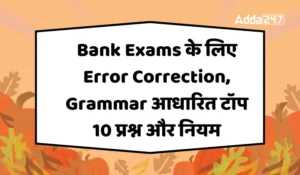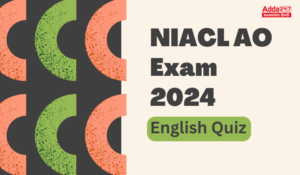English Quiz For NIACL AO Mains
Water and electricity are considered basic resources to live in modern times. Water is the most important because without it there literally would be no life. Electricity also holds a place of grave importance because most of modern existence is powered by it. However, there are only so many sources of fresh water in the world. Similarly, there is only a limited amount of fossil fuels that can be used to generate electricity. These two resources are essentially finite. Our population, on the other hand, keeps growing every day. As this happens, the demands for these two resources increases but their sources become scarce.
Unfortunately, we are so used to having an abundance of both that we have grown careless. Every day in many ways we waste huge amounts of these resources without thinking twice. For many of us it is habit that we have cultivated from childhood. Ensuring that the next generation does not follow the same wasteful habits is now a priority.
We need to ensure that the urgency of dwindling natural resources, the reality of environmental damage and the immediate need for conservation is something that new generations understand very well. The best way to do so is by educating students. Students need to be aware of this because they are the agents of change. They are the ones who gain the latest knowledge and they are the ones idealistic enough to utilize it for everyone’s betterment. For this reason, environmental sciences need to be taught in every grade.
Students are learning as they grow up that these resources are essential to our existence. They’re also learning that the same resources are finite. Students more open to new ideas and thoughts. Therefore, when shown the impact of the lack of resources and conservation of those same resources, students are much more likely to follow steps for conservation. They are also more likely to involve their families and communities in the effort to conserve these two resources. Most importantly, though, students have inventive minds and are most likely to come up with ideas that can help us use less or conserve more of water and electricity.
If we want generations to grow up with conservation as one of their values, it is very important that we teach them this value right from the beginning. The earlier we do so, the more well embedded these values will be. In our efforts to conserve electricity and water students must be the forerunners. Only then will we see effective change.
Q1. Which two main resources have been mentioned in the above passage?
(a) water and air
(b)electricity and soil
(c)water and electricity
(d)air and electricity
(e)None of the above
Q2. According to the passage, what all things should the new generation understand well?
(a) the reality of environmental damage
(b) the immediate need for conservation
(c) the urgency of dwindling natural resources
(d) Both (a) and (c)
(e) All (a), (b) and (c)
Q3. Which of the following is FALSE in context with the given passage?
(a) Students are learning as they grow up that these resources are essential to our existence.
(b) Students need to be aware of this because they are the agents of change.
(c) Electricity also holds a place of grave importance because most of modern existence is powered by it.
(d) Unfortunately, we are so used to having an abundance of both that we have not grown careless.
(e) All are true
Q4. Which is OPPOSITE to the word WASTEFUL given in BOLD?
(a)careless
(b)extravagant
(c)careful
(d)lavish
(e)doubtful
Q5. Which is SIMILAR to the word EMBEDDED given in BOLD?
(a)ingrained
(b)rude
(c)normal
(d)loose
(e)different
Directions (6-10): In the passage given below there are blanks which are numbered from 6 to 10. They are to be filled with the options given below the passage against each of the respective numbers. Find out the appropriate word in each case which can most suitably complete the sentence without altering its meaning. If none of the words given in options fits in, mark ‘None of these’ as your answer choice.
We all agree that most of the things we want are not really for ourselves. We want them to impress our neighbours, friends and relatives. This kind of life can never be ——–1——– or pleasurable. This is because we are not born to please or impress others and we can never even do so. Whatever we do people only look for ———–2———– to find flaws in us and this leaves us all the more dissatisfied. We try to earn more and more, reach at a high position in the company, increase our social circle and shop for expensive clothes and household items – what for? All this is done to ——-3——- a good social standing. Now, this is not to say that there is something wrong with being ambitious and making a good living. All this might as well bring us satisfaction at some level but it also takes away a lot from us. However, in the quest of making it big professionally and earning more and more to ——4——- the undying desires people spend a lot of time at work and neglect their parents, spouse and kids. This ———5——– them from the family and disturbs their personal relationships and all this only leads to stress.
Q6.
(a) destiny
(b) pleasure
(c) fulfilling
(d) nostalgic
(e) contentment
Q7.
(a)opportunities
(b)demands
(c)catalyzed
(d)dubious
(e)gloomy
Q8.
(a)randomize
(b)establish
(c)flourish
(d)chance
(e)standing
Q9.
(a)reimburse
(b)although
(c)henceforth
(d)thirsty
(e)quench
Q10.
(a)distances
(b)revealed
(c)replenish
(d)cajole
(e)jubilee
Direction (11-15): In each of the following sentences, there are two blank spaces. Below the sentences, there are five options with a pair of words each. Fill up the sentences with the pair of words that make the sentence grammatically and contextually correct.
Q11. When you stop living an ——————– life trying to impress others and turn towards a simple life you grow close to your ———————.
(a) articulate, stems
(b) artificial, roots
(c) stingy, ground
(d) impressive, parents
(e) guarded, distance
Q12. Most of the people suffer from various —————— diseases which have almost no cure or ————————- to cure.
(a) healthy, impractical
(b) disaster, loose
(c) calamitous, obvious
(d) fatal, impossible
(e) ruinous, careless
Q13. Generally people know the definition of making their lives —————— and happier but they forget the key —————– of control, discipline and patience.
(a) shocking, level
(b) maintenance, rolling
(c) healthy, pointing
(d) gloomy, astound
(e) healthier, point
Q14. Several phrases are —————— by various poets and authors from time to time, however only few remain ————————- even after centuries of their origin.
(a) coined, popular
(b) coinage, populous
(c) held, ignorant
(d) guided, real
(e) reminder, faded
Q15. Stress and ——————- builds up when you have a lot of tasks at hand but are —————– about where to begin and how to go about them.
(a) feedback, given
(b) desire, henceforth
(c) troublesome, forgiving
(d) anxiety, clueless
(e) fearsome, clue
Click Here to Check Answers
- Tips and Tricks To Solve Cloze Test Questions For Bank and Other Competitive Exams
- Reading Comprehension Tips For SBI Clerk Exam 2018
- Conjunctions: English Language Notes for Bank and Other Competitive Exams





 Practice for English Section: 15 Cloze T...
Practice for English Section: 15 Cloze T...
 Bank Exams के लिए Error Correction, Gram...
Bank Exams के लिए Error Correction, Gram...
 English Quiz For NIACL AO Mains 2024 Exa...
English Quiz For NIACL AO Mains 2024 Exa...










